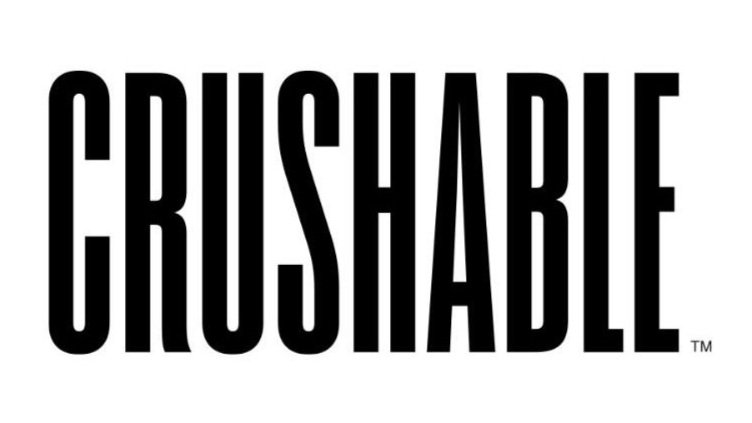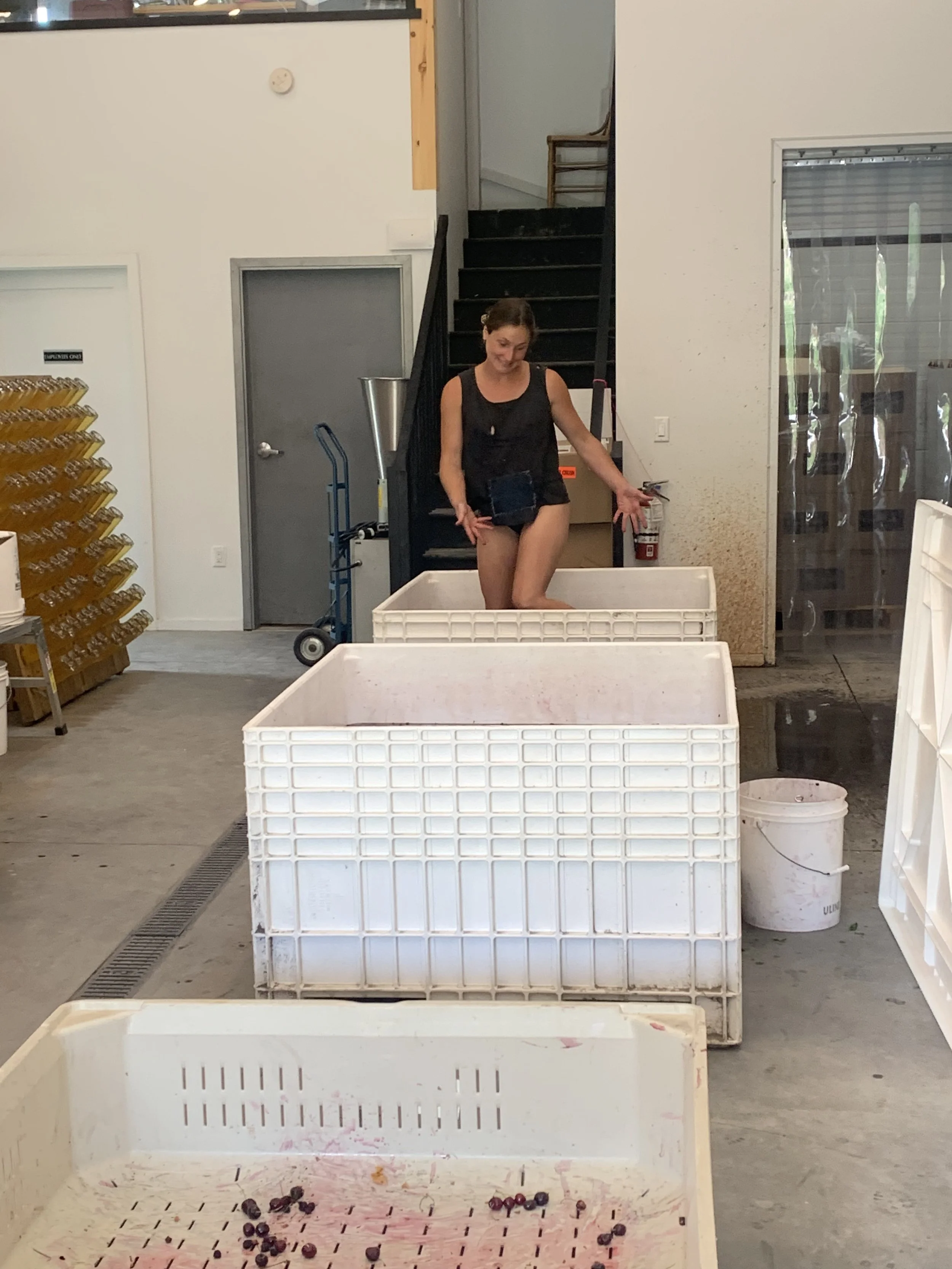A conversation with Creek & Gully cidermaker, Alyssa Hubert
Pulling into the Creek and Gully parking lot, dogs and children run amok, framed by a field of sunflowers quietly on the cusp of bloom. Sauntering up to the classic A-frame structure, a view over looking a glittering Okanagan Lake reveals itself, one that would render any cynic soft.
Amidst these vignettes you’ll find Alyssa Hubert, cidermaker, moving about with a palatable focus - cases of cider being packed for shipping, flatbeds prepped for transport, and fermenting bins cleaned and organized, awaiting the impending harvest.
Alyssa sports a vintage Blue Jays t-shirt, cut offs and Blundstones, an ensemble The Sartorialist might capture an off duty model donning, wandering Bushwick. It’s clear though, for Alyssa, function takes precedence over form.
There is a seriousness to Alyssa’s demeanor that is both intriguing and intimidating. The commitment to her craft is obvious, though her stoicism strikes as a charming veil, one that poorly masks her tenderness. It’s the final result that affirms her talent - you just don’t make cider that tastes this good haphazardly.
LM: Would you say your approach is similar to winemaking? Why or why not?
AH: I treat them the same. I’m still learning—and will always be learning—to make both beverages, and sometimes I learn different things about each of them as I work with them, but I treat them the same. I treat them the same because that's where my experience and my philosophy lies.
LM: Why do you think there is such a stigma to cider in North America?
AH: I don’t know if there’s a stigma to cider, or what you think that stigma is, so much as a lack of knowledge as to how many different ways cider can be produced. For the people who express a non-interest in cider, I generally see that in two parts. There are people who view cider as unserious, and thus deem it unworthy of their time, and there are people who think cider is only one thing—sweet, super fizzy, booze juice in a can. And, of course, these two reactions are wrapped up in each other, and the history of cider in North America. The vast majority of North American cider—in Canada and the US—is sweet, super fizzy, booze juice in a can, and has been that since basically WWI.
But, of course, around the world cider isn’t just that, and I do feel like, here in North America we’re learning that.
LM: What would you say is your greatest challenge as a cider maker?
AH: Dessert apples! Apples are different from grapes… And dessert apples are different from cider apples. At Creek & Gully we only use dessert apples so, I am constantly learning about this.
LM: What's your response to the naysayers or haters of the category?
AH: I don’t encounter haters, and for the most part people that say, “No, I don’t like cider,” just need to be prompted to try it. Or prompted into a conversation. And that’s no different than wine. People—we all—have ideas in our heads of what we like—what we think we like—and some people are just more staunch than others. At the cidery, in the tasting room, it’s easy to encourage someone to try—that’s what the tasting room is for, trying stuff, “You’re already here, just give it a try…”
And to recall your question above, for people that come with a preconception of cider that is unserious, I generally just talk about what we do—how we grow apples, how I make cider—in the hopes of letting them know that what we do is work, a skill, and intentional. I also joke that I don’t want ‘serious’ beverages all the time! I mean, who wants that?? Hah.
LM: Can you share a memory/experience since working with Creek and Gully that's special to you?
AH: Getting our first riddling racks was very special! It felt like with the racks what we are trying to make is more connected to history, or something silly like that. It was just a feeling.
Also, Anna and I went to pick them up, and one of our neighbours was also picking up some gear in a brand new fancy pick up—like two days old or something—and all the boys were just ogling this truck and not wanting to scuff it up, and then Anna and I just loaded five riddling racks into the back of her little tin-can 1999 Honda CRV. HAH!
LM: Let's play a game of speculation - what does your crystal ball tell you about the future of the Canadian wine & cider landscape?
AH: Ahhhh, that it’s in trouble…
The answer to this question, at least as far as I see it, is an essay—a series of research papers; Heck! A book! A series of books! (there are books I can recommend…)—about the confluence of a myriad of different socioecological forces, happenings, practices, and knowledges—or gaps in our practices, happenings, and knowledges.
We need to challenge our theories of the nature-culture relationship—they’re being challenged whether we look at them or not. While it is easy to agree that a reconceptualization of nature-society and the relationship between nature and society is needed, it is much harder to try and do this, as even posing the issue as one of dissolving the dualism, seems to reproduce the dualism which we are seeking to dissolve/resolve. If nature and society are active partners locked in an irreversible, continuing process of mutual determination, how is the materiality of these conjoined natures to be theorized??
I don’t have a positive—or easy—answer to this question, nor do I feel I can justly answer it.
LM: Tell me about your background - where are you from, where did you study, and how did you land in Naramata?
AH: Oh gosh! That seems like a lot! Which part do you want? I feel like I have a life in many parts. Hah! Does anyone else feel this way? Also, it really seems rather boring written out...
I grew up in very South-Western Ontario—in Chatham-Kent. My first job at 12 was detasseling corn and tying tomatoes! I went to the University of Guelph for both my undergrad and my masters—though I briefly started a masters at Western in between, I promptly dropped out before the Christmas Holiday—and lived there on and off for eight years. There are so many things I miss about Guelph all the time!
I don’t have any formal training in oenology. I’ve learned on the job. And while I’m not a farmer I have been working around agriculture for the last ten years, whether that was my masters—on the socioecological lives of small scale organic farmers and farms—writing environmental farm plans, or making wine and cider. I had brief stints in wine in London, UK, and in South Australia, both of which were incredible learning experiences!
How did I end up in Naramata? Oh, any number of things, just like anything else… I used to joke with people who asked me how I made it out West—because everyone asks that—that I read too many books and I followed a boy. Which is the truth in a way—I mean, the boy was a prompt—but much of what I read at the end of high school and throughout university—whether it was fiction or not, for school or not—featured the West, or getting to the West. And so I just read more. And I guess I saw myself in those narratives. Put myself in them. Was fascinated by them. So, West I went. As for Naramata, I rode into the Okanagan Valley from the Kootenays—I was travelling across the province on my bike for my masters—and I just thought it was an incredible place that I wanted to return to… (Though, honestly, when I took my first job out here in 2015, I still had no car and was riding my bike for everything, so I needed wherever I worked to have a shower… And so, my first job in the cellar was in Naramata at a place that had a shower…)
I can see that you’re going to ask me about dreams I have, and I’m not going to answer you, but I will say that I used to dream about moving out West, farming and making wine. Used to lie on the floor with friends and plan it out…
LM: What are some goals or dreams you've yet to achieve?
AH: Ohhhh! There are so many! But I keep my dreams pretty close to my chest. A bit out of superstition, and a bit out of some sort of self-protection. It feels something to the effect of, these things—these dreams and ideas—inside of me will exist there until I am ready to make them real. One day, I will take these things outside of myself and then they will become real. And I have to be ready for that.
LM: What are some of your guilty pleasure beverages and foods?
AH: Hmmm, well, I prefer to think of these things as indulgences rather than something I might feel guilty about… Something you allow yourself the pleasure of, whatever pleasure it is that that thing might give you, whether it is the taste of the thing itself, or the memory of the thing, or the fleeting moment of the thing…
Wine is certainly an indulgence of mine!
I love tonic water, and dill pickle chips. Sometimes I buy two litres of extra pulp orange juice and drink the whole thing in a morning, and when I was 12 I used to put cheddar cheese on triscuits and put them in the microwave to get all melty and slightly crispy… I love Ben and Jerry’s chocolate chip cookie dough ice cream, and Comté, and lemon curd. Also, all types of olives. All of them. I love my homemade hamburgers. And key lime pie with shortbread crust!
LM: Most talented/up and coming folks on the Canadian scene?
AH: All my pals! HAH. I don’t want to just write a list here; contact me for a list.
But really, we have—and I am fortunate to be a part of—a great community of people working out here in BC in this industry. Whether they are starting their own things or moving into larger roles at established businesses, and whether they’re farming, fermenting, or selling and educating—there are great people at all corners of this industry. I do wish that we had more of a cross-country connection in this industry. That would be so lovely! This country is just so huge, and this is such a located-in-place industry, I guess.
The Crushable x Creek and Gully pack will be available Thursday, July 21. Subscribe here.



